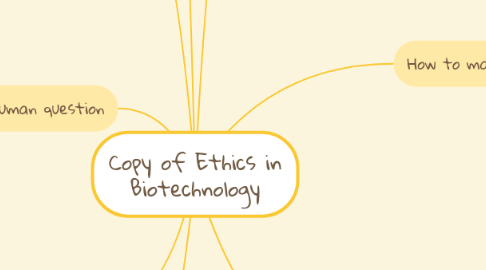Copy of Ethics in Biotechnology
por Farisya Ailin


1. What is ethics?
1.1. Ethics identifies a code of values for our actions.
1.2. Dilemma-based discipline.
1.3. Bioethics
1.3.1. Area of ethics that deals with the implications of biological research and biotechnological applications
2. Should humans and other animals be cloned for any reason?
2.1. Prohibits discrimination based on genetics and the improper use of genetic information in health insurance
3. The human question
3.1. Patients have the right to be fully informed about the potential effects/risks of the experimental treatment
3.2. Placebos
3.2.1. A safe but non-effective treatment
3.3. Informed consent versus using placebos to achieve the objectives of the experiment.
4. Ethical Issues in Biotechnology
4.1. Established guidelines for different levels of biosafety containment.
5. Cloning
5.1. Creation of human embryos could lead to matched embryonic cells for patients
6. Approaches of Ethical Decision Making
6.1. Hippocratic Oath
6.1.1. "Do not kill"
6.1.2. "To help, or at least do no harm"
6.2. Utilitarian approach
6.2.1. States that something is good if it is useful.
6.2.1.1. An action is moral if it maximizes pleasure among humans.
6.3. Deontological approach
6.3.1. Focuses on certain imperatives
6.4. Modern Bioethics
6.4.1. Refined the utilitarian and deontological approaches
